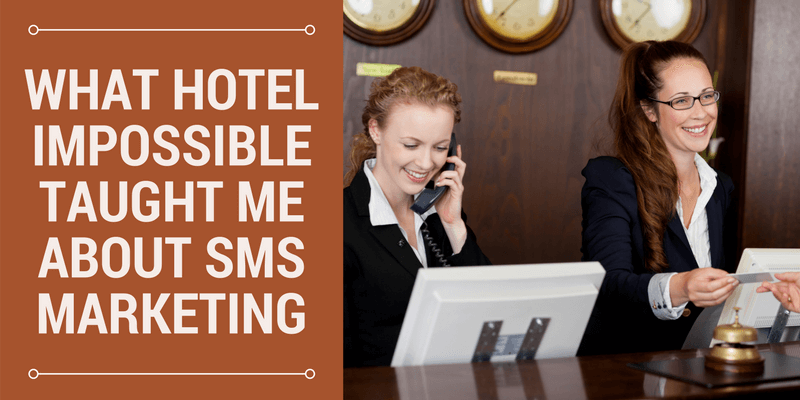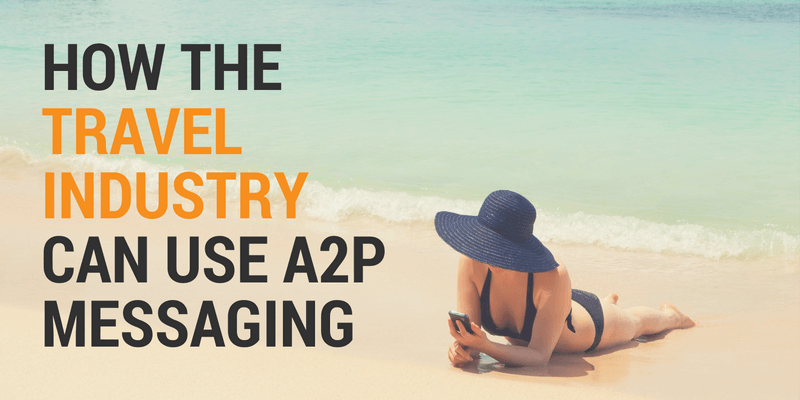5 Ways Hotels Can Use SMS Marketing to Increase Brand Loyalty

More and more industries are tuning in to the advantages that SMS marketing can offer their business. SMS marketing is not only useful for acquiring new customers, it can be used to increase brand loyalty as well.
This is particularly true for the hospitality industry, which faces challenges unique from other industries, in that they are on the front line when it comes to delivering customer service.
Why Choose SMS Marketing for Your Hospitality Business
Let’s look at the value proposition of SMS marketing for a second. Despite the growth of other communication channels, such as Facebook chat, WhatsApp and even Skype, SMS remains one of the primary communication channels in 2017.
Recent research by Nielsen shows that a massive 14.1% of a smartphone user’s phone time is spent texting. This dwarfs the next most popular category, social media, which takes up just 10.2% of a user’s phone time.
In North America alone, more than 6 billion text messages are sent each day. Worldwide, that figure grows to 23 billion text messages.
What is even more astounding is that SMS messages have a 98% open rate. Compare that to email and you’re looking at more like 20%, and that assumes you have a clean, responsive list.
And it gets better. More than 90% of SMS messages are opened less than 3 minutes after they arrive, and if you’re used to 2% response rates from other communication mediums, then be prepared to be blown away by the response you get from SMS.
Research shows that text messages have a 45% response rate. No, that’s not a misprint – 45%. Just imagine the potential of SMS for your hotel’s marketing.
There are few businesses that can’t benefit from SMS marketing, but hospitality businesses come right at the top of the list of industries that will benefit the most from this medium. While other industries are forced to get creative when sending out texts, it is relatively easy to find ways of integrating SMS into your hotel or restaurant marketing strategy.
5 Ways SMS Marketing Can Help Your Hospitality Business to Increase Brand Loyalty
Let’s look at a few ways forward-thinking hospitality businesses can use SMS marketing to engage with customers.
1. Enhance Customer Service
Is your customer service helpline overloaded with calls? Take the strain off overworked call centre employees and implement an SMS customer service strategy.
SMS can enhance customer service levels, so use it to provide a level or service that goes above and beyond your current offering. For example, send out a text message notifying customers that their room has been cleaned and is ready for occupation. No more forcing customers to wait until 2:00 pm, they can check-in as soon as their room is ready.
2. Streamline Check-In and Check-Out
Why not take this one step further and integrate the entire check-in/check-out process? Customers hate having to check-in, so why not allow them to do it all by SMS.
These days, the check-in process is largely automated, so integrating it with SMS is a relatively simple process. You just need to send the customer a text message asking them to reply with a code to confirm receipt. Now all the customer has to do is collect the key from the front desk and they’re done.
3. Reservations
Can your customers set-up reservations by text? If not, you may think this is a difficult or expensive thing to achieve.
But at Fastsms, we can integrate your reservations software with our online SMS platform using our powerful API. This makes it simple to offer reservations by SMS and frees up the front desk to focus on other more important things.
4. Offer Exclusive Discounts
This is another area where you can get creative. Use SMS to drive customers to your restaurant or spa using promotions.
For example, schedule a message for 11:00 am that offers “10% OFF appetisers in the restaurant today, book before 1pm.” That should drive a healthy amount of extra business to your restaurant.
You can run similar messages at different times of the day. But don’t go overboard with it, try and limit messages to 1 or 2 a day when the customer is on-site. Also, try and vary the offer each day to keep them interested.
And don’t forget, you’re not limited to sending text messages when the customer is staying with you. You can send them discount offers at any time of year to try and persuade them to come back.
For example, “Book a five-night stay in the month of May and get the 6th night FREE” should get the phones ringing. However, try not to bother your customers with too many messages, SMS is regarded as a personal communication medium and you don’t want to breach the trust or privacy of your customers.
5. Surveys and Feedback
Finally, don’t limit your SMS messages to promotional endeavours. SMS is useful for generating customer feedback and recommendations. The information you collect will prove vital to improving your customer satisfaction rates and help you develop new services in the future.
The best time to ask for this type of feedback is with a simple thank you message after the customer checks-out. Don’t forget, your customer is likely travelling when they leave you and this can mean a lot of waiting around in airport lounges or on train station platforms. This is the perfect time for them to leave feedback about their stay while it’s still fresh in their memory.
How We Can Help
These are just a few of the ways hospitality businesses can use text messaging to increase both revenue and customer satisfaction. At Fastsms, we are a well-established provider of SMS services to hospitality businesses across the UK.
Our cloud-based platform enables you to send and receive text messages to and from your customers. You can also fully integrate our platform into your back office reservations software, using our powerful API.
Now you can have one powerful integrated SMS marketing solution that powers customer engagement and enhances communications across your entire business.
For more information about how we can help drive your hospitality business forward, download our free restaurant and hotel marketing guides.
Related Articles
Hotels Use SMS Messaging to Head Off Bad Reviews
Online travel and review sites are great for travellers. They are good for hotels too, but they offer a double edged sword. User reviews are unfiltered – that is the travellers can say whatever they like both good and bad. And managing a bad review can be difficult, but how can SMS help?
What Hotel Impossible Taught Me about SMS Marketing
In Hotel Impossible, Anthony Melchiorri saves struggling hotels. It turns out some of the advice he gives them could make you a lot more money. It’s all about marketing and knowing where to get the best ROI. Read the blog to see if you’re spending in the right places.
Don’t Believe The Myth of The “Cashless Shopper”
Sometimes bloggers or journalists get a bit carried away. They see some data or fact, and run off to declare there’s a trend you need to know about. The latest one I’ve seen is all about how to reach the generation of “cashless shoppers”. The argument goes that you need to use SMS messaging to reach customers because they are all shopping online – where you obviously can’t pay in cash.
How Campsites Can Use SMS Messaging to Get New Business
The campervan and caravan industry grew 16% this past year. Campsite and holiday park owners can connect with the thousands of new travellers using SMS messaging. After all, 76% of travellers prefer to take their mobile on holiday rather than a friend.
How the Travel Industry can use A2P Messaging
The travel industry has made some inroads into using SMS messaging, but hasn’t yet taken real advantage of the potential of A2P messaging. Find out how it can be used to save time and provide the high-quality service today’s mobile travellers expect.
The Art of SMS Marketing for Bars, Pubs and Clubs
SMS marketing can be a double-edged sword, which is why it's crucial to ensure that each one of your campaigns is well thought out, immaculately spelt, financially accurate (i.e., the prices listed are correct), and, perhaps most importantly, the time and date is 100% accurate. Only once you have triple-checked each one of the components should you then consider sending out a batch.
Drive Up Attendance During Festival Season with SMS Messaging – Part 1
People love live music. Ticket sales worldwide are expected to reach $20.5 Billion (~£14.2B). The UK alone has around 900 festivals each year. There just aren’t enough headliners to go around. What else can you do to draw people to your event (whether you have a headliner or not)? The answer: Make your event an experience rather than just a destination.
Drive Up Attendance During Festival Season with SMS Messaging Part 2
Festival season is upon us! Experienced festival organisers predict that to be successful you need more than just music. You’ll need to offer an experience to your attendees. In the last blog I covered some of the reasons for that, and ideas on how to start building your SMS marketing list before your festival begins. In part 2, we’ll take a look at how to use SMS to create engaging experiences for attendees while they are at your festival, and even after they leave.
Do hospitality trends in 2016 include SMS messaging?
Travel Agents Should use SMS Messaging During the Off Season
Now that the peak travel season is over, how can travel agents stay top of mind in their customers? If you look around, you’ll notice everyone seems to have a mobile. That means SMS is the perfect way to reach them and make sure you’re not forgotten.












